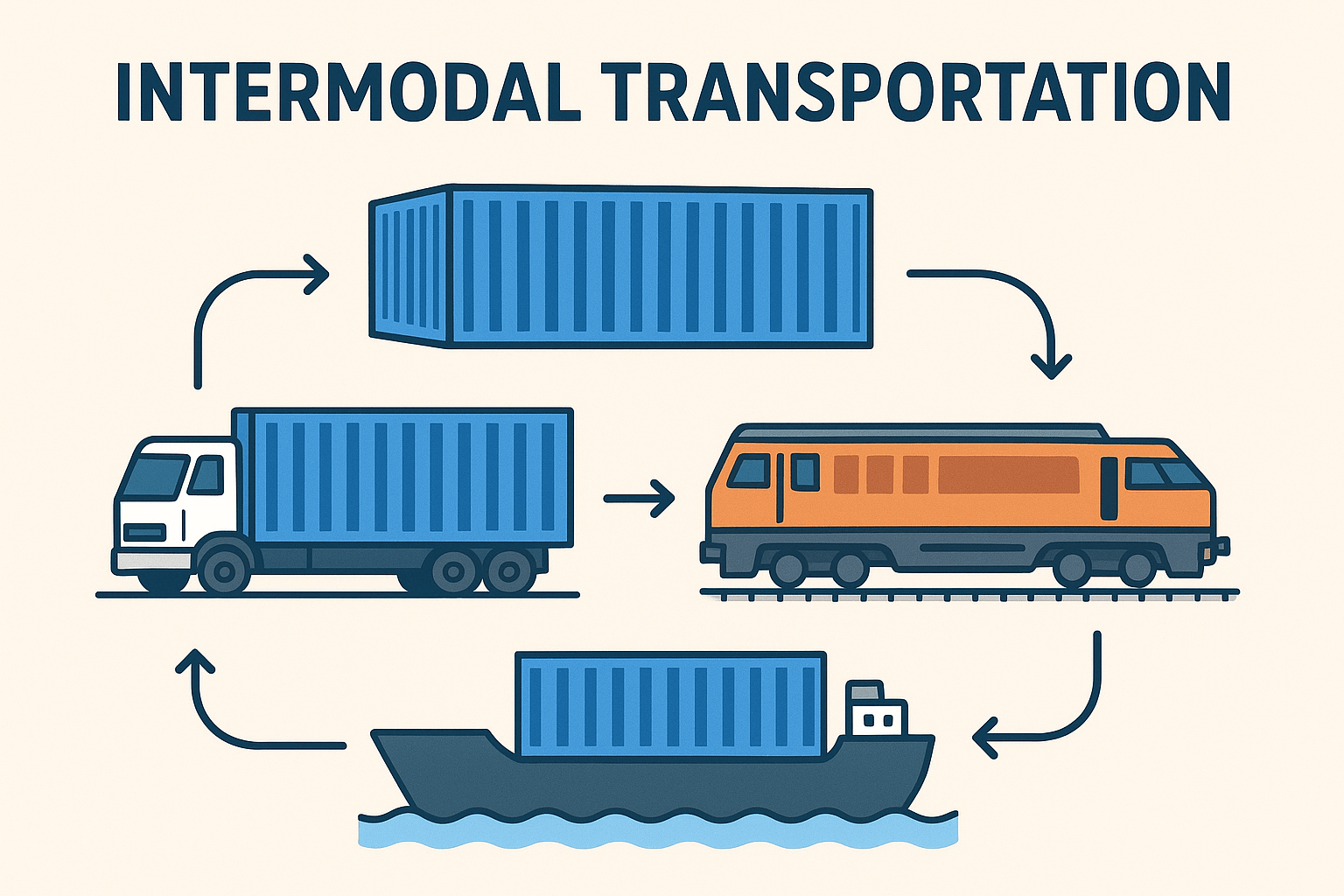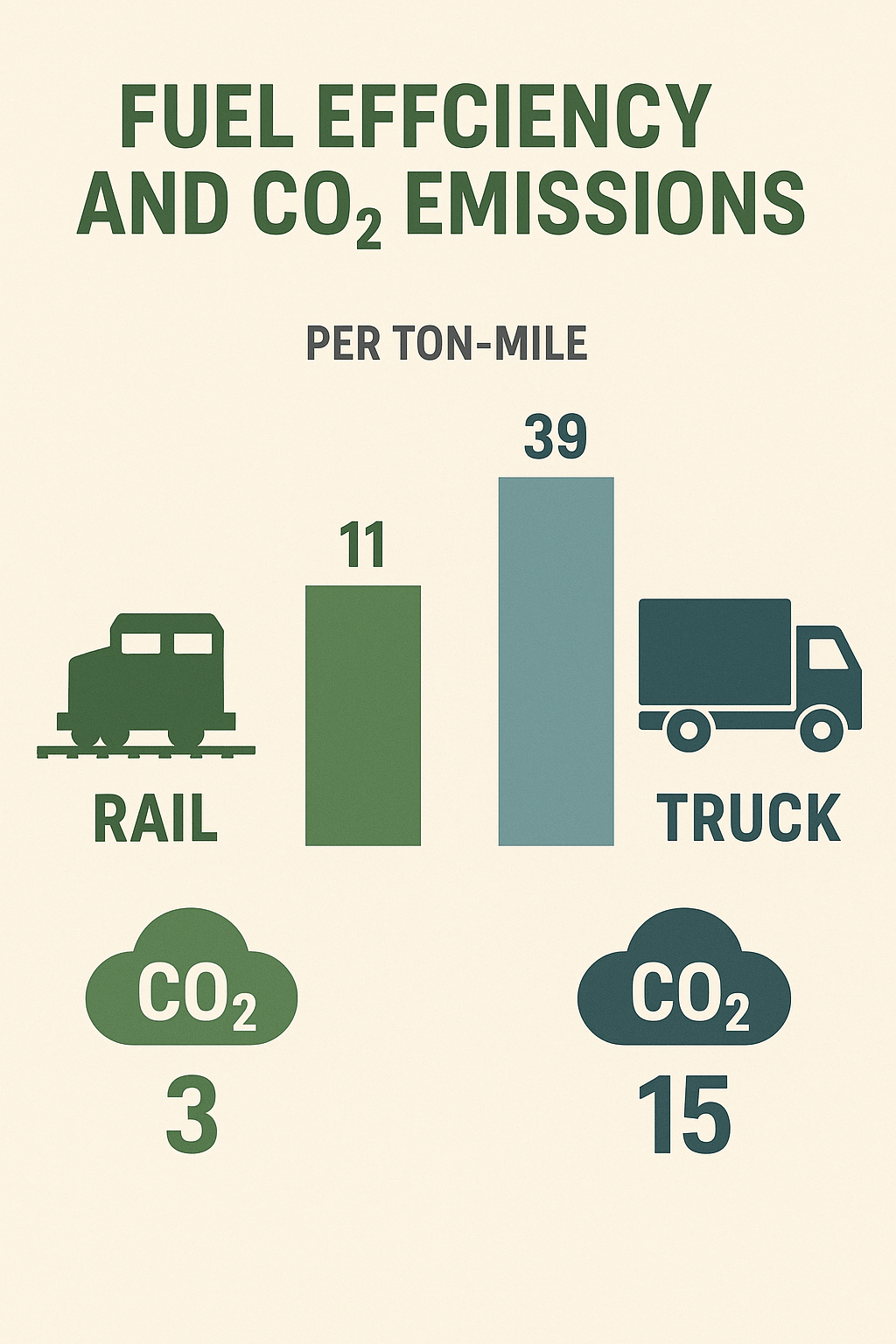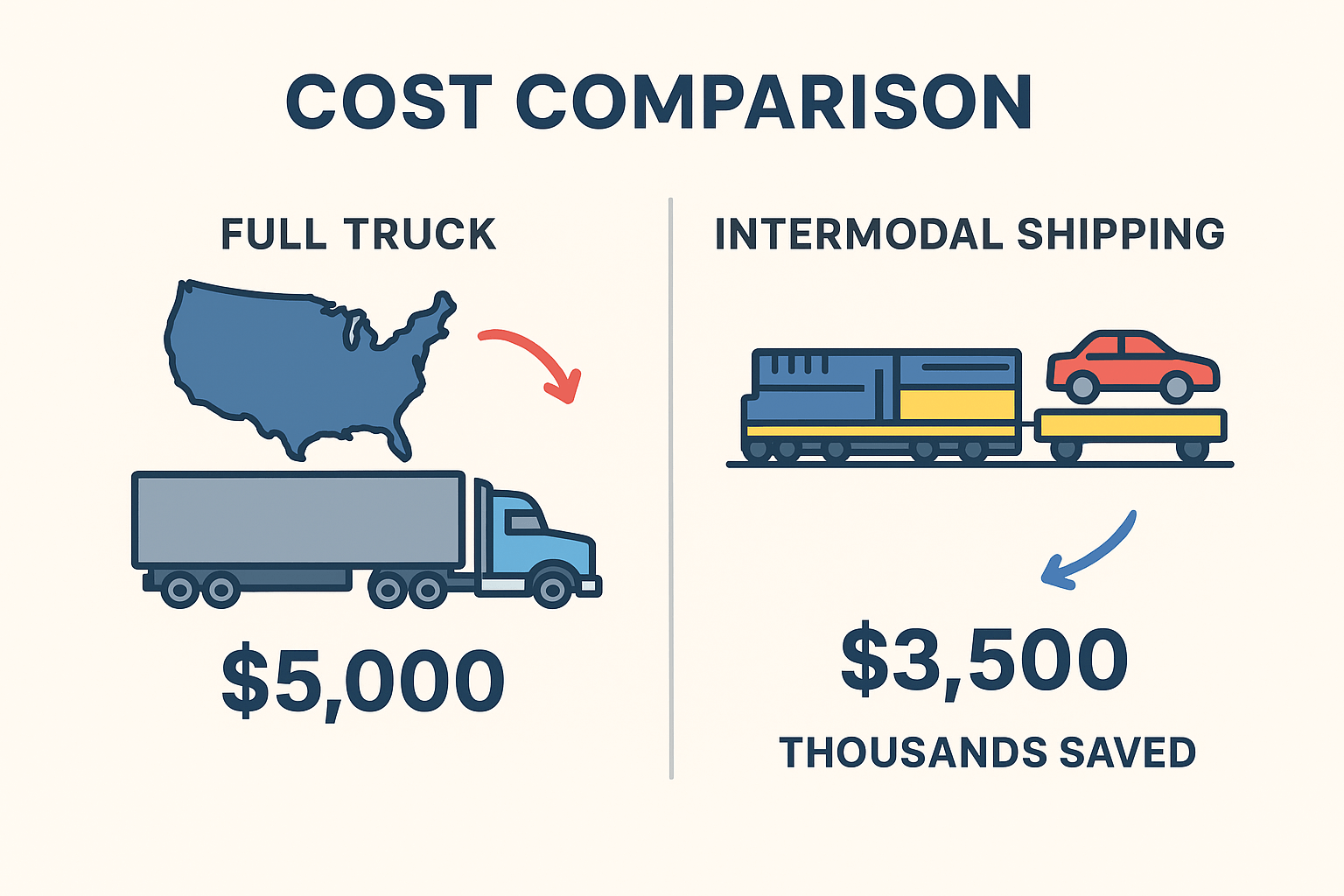Looking to save on shipping without sacrificing reliability? This guide explains when intermodal transportation makes sense for your freight. You’ll learn how combining trucks, trains, and other modes can cut costs, reduce delays, and even help the environment. Perfect for budget-conscious businesses and individuals, this article shows when intermodal shipping can be your smartest, most efficient option.Looking to save on shipping without sacrificing reliability? This guide explains when intermodal transportation makes sense for your freight. You’ll learn how combining trucks, trains, and other modes can cut costs, reduce delays, and even help the environment. Perfect for budget-conscious businesses and individuals, this article shows when intermodal shipping can be your smartest, most efficient option.
Table of Content:
What Is Intermodal Transportation?
Why Do More Shippers Choose Intermodal Shipping Today?
How Can Intermodal Shipping Help You Save Money?
Is Intermodal Transportation Reliable and Safe?
Can Intermodal Shipping Help You Go Green?
When Does It Make Sense to Use Intermodal Transportation?
When Might Intermodal Not Be the Best Fit?
How Can YK Freight Help You Get Started?
What Is Intermodal Transportation?
Intermodal transportation is a shipping method that combines two or more types of transport — most commonly trucks, trains, and ships — to move freight efficiently from point A to point B. What makes this method special is that the goods stay inside the same container the entire time. That means there’s no need to unload or handle the cargo every time it switches from truck to train or ship, which keeps the process faster, safer, and more cost-effective.

For example, a car or auto part might start its journey on a truck, then continue on a train for the long-distance part of the route, and finally return to a truck for final delivery. Each carrier manages its own leg of the trip, but the container remains sealed and secure throughout.
At YK Freight, intermodal shipping is all about smooth coordination. The company works with trusted carriers in every mode to make sure there are no delays or mix-ups during transfers. Every stage — from loading to rail movement to final delivery — is carefully planned so that customers can save money and still enjoy reliable, on-time service.
Why Do More Shippers Choose Intermodal Shipping Today?
In today’s shipping market, traditional trucking is facing more challenges than ever. Fuel prices keep rising, there aren’t enough drivers to meet demand, and road congestion slows deliveries across the country. These issues make it harder for businesses — especially those on tight budgets — to keep transportation costs under control.
That’s why more companies are turning to intermodal transportation as a practical alternative. Instead of relying on one mode of transport, intermodal combines the strengths of several — usually rail and truck — to move freight more efficiently. For example, rail is much cheaper for long hauls because trains can carry large volumes of freight using less fuel. Trucks then handle the shorter routes, like pickup and final delivery, giving you both reach and flexibility.
Another big reason for the switch is capacity. With trucking demand so high, it can be tough to find available trucks for long-distance routes. Rail, on the other hand, offers consistent capacity and predictable schedules. That means fewer delays and more stable shipping costs — something every small business or car buyer can appreciate.
How Can Intermodal Shipping Help You Save Money?
One of the main reasons shippers choose intermodal transportation is the opportunity to cut down on shipping costs — without sacrificing reliability. When budgets are tight, every dollar counts, and intermodal shipping can make a noticeable difference in your total delivery expenses.
First, let’s talk about fuel savings. Trains are far more fuel-efficient than trucks, especially over long distances. A single railcar can move one ton of freight nearly 500 miles on just one gallon of fuel. That’s why switching part of the journey from truck to rail can lower your per-mile shipping cost and keep your overall budget under control.
Second, intermodal shipping helps reduce manual labor costs. Since freight stays inside sealed containers the whole time, there’s no need for extra handling or repacking during transfers. That means less risk of damage, fewer man-hours spent on loading, and ultimately lower labor-related expenses.
Third, intermodal offers more predictable pricing. Long-distance trucking rates often fluctuate because of fuel prices, road tolls, and limited capacity. In contrast, rail pricing tends to stay more stable, allowing shippers to plan their budgets more confidently — especially for regular or seasonal deliveries.
Here’s a simple example. Imagine a small car dealership that needs to move vehicles from the East Coast to the Midwest. Using only trucks could quickly eat up the profit margin due to fuel and driver costs. But by choosing YK Freight’s intermodal solution, the cars can travel most of the way by rail and finish the trip by truck. The result? A faster, more affordable delivery with thousands saved per shipment.
Is Intermodal Transportation Reliable and Safe?
When you’re shipping valuable goods — whether it’s auto parts, vehicles, or general freight — safety and reliability are just as important as cost. That’s where intermodal transportation really stands out.
One of the biggest advantages of intermodal shipping is security through simplicity. Since freight stays sealed in one container from start to finish, there’s no need to unload or handle it between modes. Fewer transfers mean fewer chances for damage, loss, or delays. Containers are designed to withstand long journeys and rough conditions, keeping your cargo safe no matter how far it travels.
Another major benefit is fewer road-related risks. Trains avoid highway congestion, traffic accidents, and unpredictable weather delays that often affect trucks. That makes rail transport not only safer but also more reliable in terms of timing. Combined with short, controlled truck routes on both ends, it results in a smoother, more dependable delivery process.
YK Freight adds an extra layer of reliability by using real-time shipment tracking. Every stage of your delivery — from loading to transfer to final arrival — is carefully monitored. Customers can stay updated and confident that their freight is moving exactly as planned.
Plus, rail networks offer guaranteed capacity, meaning your shipment won’t be stuck waiting for an available truck or driver. That consistency helps YK Freight deliver on schedule even during busy seasons when over-the-road shipping might slow down.
Can Intermodal Shipping Help You Go Green?
Yes — intermodal shipping is one of the most effective ways to make your transportation strategy more eco-friendly. By combining different modes of transport, especially rail and truck, you can significantly cut down on fuel consumption and greenhouse gas emissions without hurting delivery performance.
Rail is the key factor here. Trains are three to four times more fuel-efficient than trucks, meaning they use far less energy per ton of freight moved. Every time a shipment switches from road to rail for the long-distance portion of the trip, it helps reduce the overall carbon footprint. Over time, those savings add up — not just in fuel costs but also in environmental impact.

For YK Freight customers, going green doesn’t have to mean paying more. Intermodal shipping lets you save money and the planet at the same time. Fewer trucks on the road mean less congestion, fewer emissions, and cleaner air — benefits that matter to both businesses and communities.
In today’s world, sustainability is more than a trend — it’s an expectation. Many buyers and partners prefer to work with companies that take environmental responsibility seriously. By choosing intermodal transportation, you’re not just improving efficiency; you’re also building a positive brand image that shows your business cares about the future.
When Does It Make Sense to Use Intermodal Transportation?
Intermodal transportation isn’t the best fit for every shipment — but in the right situations, it can deliver major savings and efficiency. Knowing when to use it helps you get the most value from your logistics budget. Here are the key scenarios where intermodal makes perfect sense:
1. Long-Distance Shipments (Over 750 Miles)
If your freight needs to travel more than 750 miles, intermodal shipping can drastically reduce costs. Rail becomes much more fuel-efficient than trucks over long distances, and it’s less affected by traffic or road restrictions.
For example, imagine you’re shipping several vehicles from Texas to New Jersey. Sending them all by truck would mean high fuel and driver expenses. But with YK Freight’s intermodal option, most of the trip happens by rail — saving you hundreds or even thousands in transportation costs while still ensuring reliable delivery.
2. Medium- or Low-Value Goods Where Time Isn’t Critical
If your shipment doesn’t need to arrive overnight, intermodal is a smart, budget-friendly choice. It’s slightly slower than full truckload transport but much more cost-efficient for medium- or low-value cargo.
Think of a small business shipping car parts, machinery, or bulk materials. Using a mix of rail and truck helps reduce costs without adding significant delays. For shipments where speed isn’t the top priority, intermodal is the perfect balance between price and performance.
3. Regular Shipments of Similar Products
Intermodal works best for companies that ship the same type of freight on a consistent basis — weekly, monthly, or seasonally. Predictable volumes allow YK Freight to plan routes and coordinate carriers efficiently, cutting costs even further.
For instance, an auto parts supplier sending out similar orders to multiple dealerships every month can save a lot by setting up a regular intermodal schedule instead of booking separate truckloads each time.
When Might Intermodal Not Be the Best Fit?
While intermodal shipping offers great savings and reliability, it’s not always the ideal solution for every shipment. Understanding its limits can help you make smarter logistics decisions and avoid unnecessary delays.
The first case where intermodal might not be the best choice is short-distance deliveries. If your freight needs to move less than 500 miles, using rail may not be cost-effective. The time and coordination needed to transfer containers between truck and train can outweigh the potential savings. In these situations, a direct truck shipment is usually faster and simpler.
Intermodal can also be less suitable for time-sensitive or urgent shipments. Since rail schedules are fixed and transfers take time, intermodal transport is typically slower than full truckload or air freight. If you need to meet a tight delivery window — for example, delivering high-value auto parts to a repair shop that needs them the next day — a dedicated trucking option might serve you better.
Additionally, very small or irregular shipments may not always fit intermodal systems efficiently. If your freight volume changes constantly, or if you don’t ship often enough to fill a container, other transport methods may offer more flexibility.
That said, YK Freight understands that every shipment is unique. Their logistics experts help customers weigh all factors — distance, delivery time, budget, and cargo type — before choosing the best transport option. If intermodal isn’t the right fit, YK Freight can still design a cost-efficient trucking or hybrid route tailored to your needs.
How Can YK Freight Help You Get Started?
Getting started with intermodal transportation might sound complicated — but with YK Freight, it’s simple, seamless, and stress-free. The company takes care of all the details so you can focus on what matters most: running your business or managing your shipment.
YK Freight’s logistics team handles every step of the intermodal process, from planning routes and booking carriers to managing transfers between transport modes. They coordinate with trusted rail and trucking partners to ensure your freight moves smoothly from origin to destination without unnecessary delays or extra handling.
Another major advantage is real-time tracking and communication. YK Freight gives you full visibility over your shipment at every stage. You’ll always know where your cargo is and when it’s expected to arrive — no guessing, no stress.
For budget-conscious customers, YK Freight also helps identify the most cost-efficient routes. Whether you’re shipping cars across states or moving freight for your small business, their experts analyze distance, fuel rates, and delivery timelines to find the best balance between price and reliability.
Further Reading:
Discover the Top Benefits of Intermodal Transport for Safe and Cost-Effective Shipping
Intermodal vs FTL Trucking: Which Freight Option is Right for You?
What is an Intermodal Carrier?
The Future of Rail Freight Transportation: Safe, Efficient, and Cost-Effective







ASK YOUR QUESTIONS